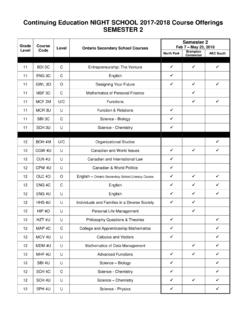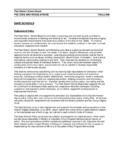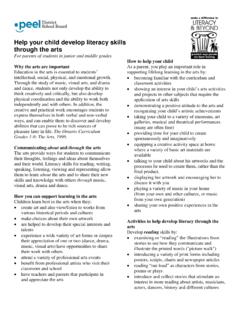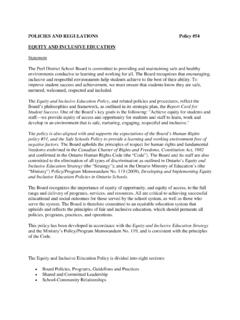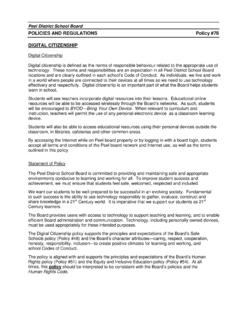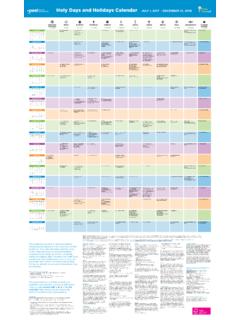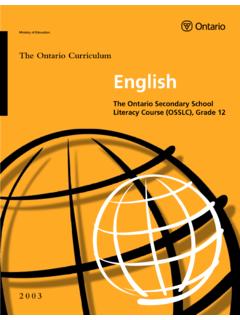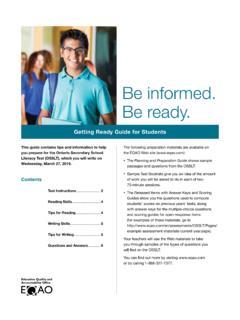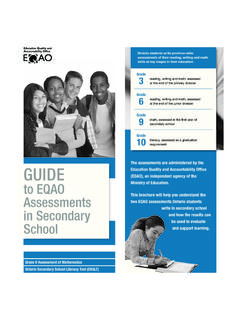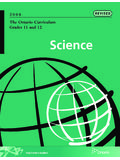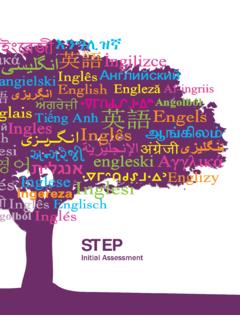Transcription of Peel District School Board POLICIES AND REGULATION Policy ...
1 Peel District School Board POLICIES AND REGULATION Policy 14. STUDENT ASSESSMENT, EVALUATION, AND REPORTING IN PEEL. ELEMENTARY AND secondary SCHOOLS. Statement of Policy The Peel District School Board (PDSB) approves a student assessment, evaluation, and reporting Policy that is applied consistently throughout the Kindergarten program and Grades 1- 12. This Policy is informed by the provincial Policy for assessment, evaluation, and reporting required in Growing Success (2010), Growing Success: The Kindergarten Addendum (2016), and provincial curriculum expectations. To ensure effective implementation of ministry Policy , direct statements from provincial and Board Policy documents have been embedded consistently throughout Policy 14.
2 These direct statements are referenced by endnotes. The Student Assessment, Evaluation, and Reporting in Peel Elementary and secondary Schools Policy is aligned with and supports the principles and expectations of the Board Human Rights Policy ( Policy 51) and Equity and Inclusive Education Policy ( Policy 54). At all times, this Policy should be interpreted to be consistent with the Board 's POLICIES and the Human Rights Code. This Policy also aligns with the English Language Learners, ESL & ELD Programs, and Services document (2007). The Student Assessment, Evaluation, and Reporting in Peel Elementary, and secondary Schools Policy is also aligned with the Ontario Ministry of Education document, Supporting Minds, and our own mental health strategy.
3 The Policy honours and enacts our goal to empower modern learners1. In PDSB, it is expected that assessment, evaluation, and reporting practices are based on triangulated evidence of student achievement of the provincial kindergarten program expectations, curriculum expectations, alternative curriculum expectations where appropriate, and student demonstration of learning skills and work habits. Purposes of Assessment, Evaluation, and Reporting The primary purpose of assessment, evaluation, and reporting is to improve student Other purposes include the collection of meaningful evidence of learning and data that will help inform instructional decisions and the promotion of student engagement.
4 Evaluation accurately summarizes and communicates to families, other teachers, employers, institutions of further education, and students themselves what students know and can do with respect to the overall curriculum Principles of Effective Assessment, Evaluation, and Reporting To ensure that the process of assessment, evaluation, and reporting is valid and reliable, and to ensure that this process leads to the improvement of learning for all students, PDSB teachers and School teams use practices and procedures that are: - fair, transparent, and equitable for all students;. Peel District School Board Policy 14. pg. 2. - supportive of all students, including those with special education needs, those who are learning the language of instruction (English or French), and those who are Indegenous.
5 - carefully planned to relate to the curriculum expectations and learning goals and, as much as possible, to the interests, learning styles and preferences, needs, and experiences of all students;. - communicated clearly to students and families at the beginning of the School year or course and at other appropriate points throughout the School year or course;. - ongoing, varied in nature, and administered over a period of time to provide multiple opportunities for students to demonstrate the full range of their learning;. - providing ongoing descriptive feedback that is clear, specific, meaningful, and timely to support improved learning and achievement;. - developing students' self-assessment skills to enable them to assess their own learning, set specific goals, and plan next steps for their learning4.
6 Assessment for English Language Learners English Language Learners requiring accommodation to curriculum expectations will benefit from a variety of accommodations to assessment, which may include allowance of extra time;. use of alternative assessment strategies ( , oral interviews, learning logs, portfolios);. use of simplified language and instructions ( , in the context of tasks that require completion of graphic organizers, cloze sentences). English Language Learners requiring modification to curriculum expectations will have the ESL/ELD box checked on the report card. Students on Steps 1-4 may require program Assessment for Students with Special Education Needs Students with special education needs are engaged in procedures that are part of a process of continuous assessment and program planning.
7 A student's Individual Education Plan (IEP). describes their educational program and any accommodations and modifications that may be required. The IEP specifies whether the student requires: accommodations only; or modified learning expectations, with the possibility of accommodations; or an alternative program, not derived from the curriculum expectations for a subject/grade or a course. For a student with special education needs who requires modified or alternative expectations, assessment and evaluation of their achievement will be based on the modified curriculum expectations or alternative expectations outlined in the student's Individual Education Plan (IEP).
8 For a student with special education needs who requires accommodations only , as described in their IEP, assessment and evaluation of achievement will be based on the appropriate subject/grade/course curriculum expectations and the achievement levels outlined in the curriculum documents6. Peel District School Board Policy 14. pg. 3. Assessment in the Kindergarten Program The primary purpose of assessment is to improve learning and to help children become self- regulating, autonomous In the Peel District School Board , it is expected that assessment, evaluation, and reporting practices are based on the belief that all children are competent, capable of complex thinking, curious, and rich in potential8 and through the practices of observation and documentation, educators collect evidence of children's learning through the process of pedagogical documentation9.
9 In Kindergarten, the term educators refers to the teacher and the early childhood educator team. Educator teams collaborate in observing, monitoring, and assessing the progress and development of the children and both contribute to communicating formally and informally with families. Assessment is the process of gathering and interpreting information that accurately reflects the child's demonstration of learning in relation to the four frames: Belonging and Contributing, Self- REGULATION and Well-Being, Demonstrating Literacy and Mathematics Behaviours, and Problem Solving and Innovating. These frames outline the knowledge, skills, and conceptual understandings presented in the overall expectations of The Kindergarten Program.
10 Educators provide descriptive feedback by noticing and naming the learning as they interact with children when they are actively engaged in play and inquiry that is intentionally designed to help each child move forward within their zone of proximal development. The process of pedagogical documentation invites students to engage in assessment as learning as they often contribute to their own assessments through their reflections on the documentation. Children are supported in setting individual goals, monitoring their own progress, determining next steps, and reflecting on their thinking and learning to help them become confident, autonomous learners. Children enter Kindergarten at different stages of development and with diverse backgrounds and experiences.
